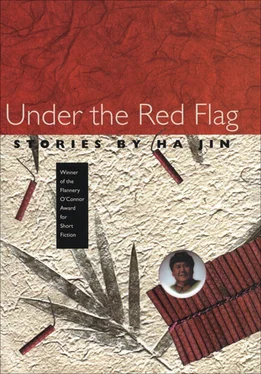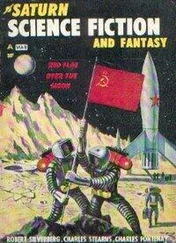This morning his father telephoned him and asked him to come home to see his aunt, who had just arrived. Sheng got permission from the leaders. Having saved a weekend, he would be able to stay home for two days. He took the three o’clock train. It was only an hour’s trip.
When Sheng reached home, his father was in the yard, reading The Hero and the Eagle , a chivalric novel. “Was the train crowded?” Ding asked pleasantly, and put the book into his pocket.
“No, I had a window seat.”
“Listen,” his father said in a low voice, “your aunt will stay here just for a few days. We’ll try to do everything to keep her undisturbed. Don’t tell her what really happened, all right?”
“Why?”
“I don’t want her to go mad again. Do you?”
“Of course not.”
“Then just repeat what I tell her. I know her temper better than you do.”
“All right.”
When Sheng stepped in the house, Shufen was helping Yuanmin cut celery in the kitchen. To Sheng’s surprise, his aunt hadn’t changed a bit: the same thick, dark hair coiled on top of her head, the same broad, chafed face, the same bulging eyes shooting eerie flashes. Her laugh was as hearty as her body was stout. She saw Sheng and said loudly, “Big nephew, I didn’t think you’re so tall, a big man now.”
“How are you, aunt?”
“Good, I’m good.”
Soon dinner was ready. The family sat down at the table while Sheng was pouring White Mountain wine, first for his aunt, then for his father, his mother, and himself. Before they began to eat, Chairman Ding straightened his back a little and spoke with a broad smile. “I am very happy today. First, my sister came. I haven’t seen you for fifteen years, Shufen. This is a happy reunion. Second, I was just told that I have been promoted vice-magistrate of Gold County.” He turned to Shufen. “I owe my luck to Mother.”
Glasses clinked and laughter filled the room while spoons and dishes jingled continuously. Sheng was overwhelmed by his father’s announcement. It was a big promotion, which also meant a lot to him. Now his life and future in the county town would be different. His father wouldn’t have to help him overtly. Just by having his old man in the County Administration, Sheng would become somebody in his leaders’ eyes. They wouldn’t dare ask him to buy soy oil for them through the back door again. Instead, they would think of what to offer him on holidays. And the pretty girls in the textile mill; he would marry the prettiest of them and settle down in the big county town. He had never thought fate would favor him this way. Emboldened by the good wine, he stood up and said, “Dad, congratulations!”
They drank up. Then Ding turned to Shufen and said, “Sis, you have seen those pictures of the funeral and the newspapers. We did want to bury Mother. But she wanted to be with us forever, so we had her cremated without waiting for your word.”
“My word is worthless,” Shufen said. “You’re her son.”
“Don’t be angry with me, sis. You see, only by putting her into a small box can we take her with us wherever we go. I’m a cadre in the Party and can be sent to any part of the country. If we buried her here, we’d have to leave her in the wilderness alone. We can’t do that.”
“Brother, don’t get me wrong. You don’t need to persuade me. I can see you’ve done everything you can. The wreaths, the pictures, the articles in the papers, what else would our mother want? It was a big funeral; every part of it was big. If she was at our home village, we couldn’t do anything like that. Our mother’s soul must be happy in heaven now.”
What a relief Yuanmin experienced! Not knowing how to express it in words, she picked up a large piece of braised pig ear and put it in her sister-in-law’s plate.
“Wait a minute,” Shufen said. “I must take something home.”
Yuanmin withdrew her chopsticks with a start. Shufen went on, “I want to take all the pictures with me, to show them to our neighbors. Brother, do you remember Uncle Liu?”
“Yes, I remember that old man.”
“He died last year and had only two wreaths. Two wreaths.” She drew a pair of large circles in the air with her chopsticks. “But our mother had thirty-six. I want to show them.”
Ding laughed and assured his sister that she could have all the photographs, together with the glossy album. Yuanmin promised her that they would mail her more. Then Ding announced that next morning Sheng would accompany his aunt to the crematory and bring the old woman back home. Though it was not a month yet, it didn’t matter. They wanted to place the ash box in the main room so that they could worship her on holidays and set a bowl for her whenever they had a good meal.
Sheng knew that not every word his father said was true, but he was convinced that the funeral affairs had to be handled this way. Now he realized what a powerful, experienced father he had, a father who could act according to circumstances and could prosper in adversities. He felt there was a lot to learn from his old man. Again he stood up and raised his glass. “Dad, congratulations!”
In our town the richest man was Li Wan. Once an army doctor, he was demobilized in 1963. Since then, he had been a physician in the Commune Clinic, where his wife also worked, as a nurse. He had a nickname, Ten Thousand, which referred to the amount he had in the bank. Years before, his nickname had been different: people called him Thousand, because at that time his savings had not yet reached five figures.
Li was a miser. The whole town talked about how stingy he was. There were many anecdotes of him: he used soda ash for toothpaste and soap; he made a rule for his wife that she must not put in more than four tiny dried shrimps when she cooked noodles; instead of buying a packet, he always bought four or five cigarettes at a time; he stored a lot of corn husks at home as toilet paper. Of course, frugality is a virtue. Everybody understands that, just as the last page of a household’s grain booklet reminds us:
From every meal you save a mouthful,
In a year you will have many a bushel.
But with his monthly salary of 110 yuan, almost twice a common worker’s, Li ought to be openhanded. He shouldn’t have haggled with egg and vegetable vendors in the marketplace as if he were buying an ox, and once in a while he ought to do his neighbors a small favor, like giving a kid a pencil on Children’s Day or an old man a stalk of sugar cane at the Mid-Fall Festival. No, he had never done anything like that. He had yet to learn how to give. That is indeed a difficult thing for a wealthy man to do.
In addition, few men can be rich without being arrogant. Li Wan was no exception. Though niggardly by nature, he could be extravagant. He had the best fowling piece—the only double-barreled gun in town, a German camera, and a Yellow River motorcycle. There was another man in Dismount Fort who owned a motorcycle, but that man, a welder in the Harvest Fertilizer Plant, was a fool. He rode the thing only for vanity and told all women who didn’t know him that he was an engineer. In Li’s case, these pieces of property showed substantial wealth. Li allowed nobody to touch his motorcycle and never gave anyone a ride.
Without the distinction between the high and the low, there would be no sorrow; without the difference between the rich and the poor, everyone could be contented. How wise is that ancient saying. The whole town hated Li, whose stinginess and extravagance made people’s lives unbearable. They all agreed that he deserved to be childless.
When the Cultural Revolution broke out, however, the two most powerful mass associations in town, the Team of Maoism and the League of Mao Zedong Thought, tried to enroll Li, not because he was rich but because he had once been a revolutionary officer. Besides, he was a doctor, useful to a mass organization, especially when it resorted to cudgels, swords, guns, grenades, and mines against its enemy. Li refused to join either of the associations, and his arrogance outraged the enthusiastic masses. As Chairman Mao instructs: “If you are not a friend of the people, you are an enemy of the people.”
Читать дальше












